A couple of years in the past, the organizers of one of many largest U.S. train applications for folks with Parkinson’s illness realized that they had an issue: Many of the college students had been white.
“We’re always asking who’s not in the room, and why are they not in the room?” stated David Leventhal, program director for Dance for PD with the Mark Morris Dance Group in New York Metropolis.
Leventhal and his group went to work. They employed extra instructors who spoke Spanish or Mandarin and translated advertising supplies, which boosted the variety of individuals from Hispanic and ethnically Chinese language communities. However efforts to recruit Black individuals haven’t been practically as efficient, Leventhal stated.
Train is taken into account basic to the therapy of Parkinson’s, with research exhibiting it will possibly alleviate signs of the illness and enhance mobility, flexibility, and stability. However individuals who run Parkinson’s train applications in a handful of U.S. cities describe nice issue in recruiting Black folks.
“In Parkinson’s, movement is medicine. So if you’re not figuring out how to engage communities in movement, it’s basically like withholding medication,” Leventhal stated. “If this were a pill, there would be an uproar.”
A small examine by researchers at Yale confirmed that after six months of train, individuals’ dopamine-producing neurons — the sort destroyed by Parkinson’s — grew more healthy.
Analysis revealed by a British medical journal this yr inspired a “paradigm shift” wherein train could be “individually prescribed as medicine” to sufferers at an early stage of the illness.
That’s why folks like Eric Johnson, founder and CEO of Motion Revolution, are pissed off. Johnson stated his Chicago-area initiative supplied a free six-month train program for Parkinson’s sufferers and elevated advertising within the Black group however acquired little traction. “It was a challenge,” he stated. “I’ll be honest.”
One massive hurdle: Many Black folks don’t even know they’ve the illness. The organic and genetic danger components have lengthy been understudied in folks of African ancestry. Current analysis recognized a novel danger issue for Parkinson’s within the inhabitants.
Research present Black individuals are much less more likely to be identified with Parkinson’s. Some level to physician bias. For instance, an article revealed final yr in Nature concluded that bias can affect the analysis of sufferers with decreased facial expressivity, a typical Parkinson’s symptom wherein the facial muscle tissues harden, making it tough to smile, elevate eyebrows, and specific emotions.
When a white particular person reveals up on the physician’s workplace with such signs, a physician would seemingly acknowledge them as indicators of Parkinson’s, stated Bernard Coley, an advocate for folks with Parkinson’s illness, particularly these in underengaged communities. However when a Black particular person has the identical signs, the physician would possibly interpret their behaviors as “disconnected” or “angry,” stated Coley, who’s on the board of the California chapter of the Parkinson’s Basis.

About 1 in 5 Black adults say they’ve been handled unfairly or with disrespect by a well being care supplier previously three years due to their race or ethnic background, in contrast with 3% of white adults, in response to a KFF survey final yr. The survey additionally discovered that 6 in 10 Black adults say they put together for potential insults and really feel they have to be cautious about their look throughout well being care visits, whereas 1 in 3 white adults say they really feel the identical manner.
Coley stated that bias can result in a delayed or missed Parkinson’s analysis, after which as soon as identified, a Black affected person could be reluctant to hitch an train program, for concern of retribution on the job.
“You do not want to come off as sick or challenged,” Coley stated, “because [your employer] will use any excuse they can to get rid of you.”
Satisfaction and privateness are different components, stated Wendy Lewis, CEO of the Parkinson Council in Philadelphia. “Black and brown families don’t share and tell their business,” she stated. “They don’t trust their story with anybody else.”
An essential step towards constructing belief and growing participation in Parkinson’s train applications is for Black folks to guide the schooling and recruitment, stated Tammyjo Finest, nurse coordinator for the Parkinson’s Illness Complete Care Clinic at Emory College in Atlanta. As a Black one that recruits sufferers for medical trials, Finest stated she typically overcomes distrust.
“When they look at me, they see themselves,” she stated.
After his less-than-successful efforts to recruit Black Parkinson’s sufferers into his train program in Chicago, Johnson concluded that the truth that he’s not Black is an “important factor.”
Leventhal, who runs the Parkinson’s train program in New York, has come to the identical conclusion. His group, the Mark Morris Dance Group, is fundraising to supply microgrants to teams in underserved communities to begin Parkinson’s dance applications, in order that “they can become the holder of the purse and the puller of the purse strings and they’re making those financial decisions on their own.”




